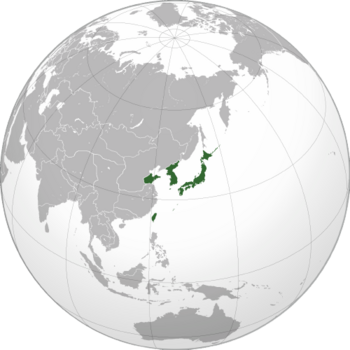Eastern Sun Union: Difference between revisions
No edit summary |
No edit summary |
||
| Line 49: | Line 49: | ||
|population_density_km2 = | |population_density_km2 = | ||
|population_density_sq_mi = | |population_density_sq_mi = | ||
|GDP_nominal = $ | |GDP_nominal = $10.3 trillion | ||
|GDP_nominal_year = 2020 | |GDP_nominal_year = 2020 | ||
|GDP_nominal_per_capita = $41,956 | |GDP_nominal_per_capita = $41,956 | ||
Revision as of 00:44, 10 May 2021
Eastern Sun Union 日東聯盟 | |
|---|---|
|
Flag | |
| Motto: "團結一致" "United as One" | |
 | |
| Capital and largest city | Tokyo |
| Official languages | Chinese Japanese |
| Government | Intergovernmental |
• President | Hayashi Ryou |
| Legislature | House of the Sun |
| Formation | |
• Weihai Summit | 10 October 1981 |
• Treaty of Seoul | 11 December 1996 |
| Area | |
• Total | 794,427 km2 (306,730 sq mi) |
| Population | |
• 2019 census | 327,701,579 |
| GDP (nominal) | 2020 estimate |
• Total | $10.3 trillion |
• Per capita | $41,956 |
| HDI (2019) | 0.944 very high |
| Currency | Sun Yen (SYN) |
| Internet TLD | .su |
The Eastern Sun Union, also known as the Eastern Union, or simply the ESU, is a political and economic union of East Asian States. Its four members have a combined population of about 327 million people, with its largest Metropolis and capital being Tokyo. As a united entity, it is the largest economy in the world, and second largest by per capita income. Its member states operate under several common laws and regulations, like its single market economy which establishes a currency union, which works using the Sun Yen. Some benefits of ESU citizens include the right work, travel and live freely in any of its member states, own property without a permit within the union, and receive medical care free of charge whereever in the union they might be.
While its member states have a right to self-governance, the Sun parliament is a bicameral paliamentary entity which passes laws and regulations pertaining exclusivelty to transnational ESU matters, such as the budget. The parliament is composed of 500 seats, with each member state acquiring a number of seats proportional to its population.
